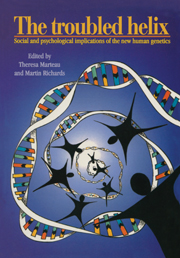Book contents
- Frontmatter
- Contents
- List of contributors
- Preface
- Preface to the paperback edition
- Acknowledgements
- Part I Personal stories
- Part II Clinical context
- Part III Social context
- 9 The troubled helix: legal aspects of the new genetics
- 10 Human pedigree and the ‘best stock’: from eugenics to genetics?
- 11 Public understanding of the new genetics
- 12 Families, kinship and genetics
- 13 Ethics of human genome analysis: some virtues and vices
- 14 Genetics and racism
- 15 Predictive genetics: the cultural implications of supplying probable futures
- 16 The new genetics: a feminist view
- 17 Afterword
- Index
10 - Human pedigree and the ‘best stock’: from eugenics to genetics?
from Part III - Social context
Published online by Cambridge University Press: 01 June 2011
- Frontmatter
- Contents
- List of contributors
- Preface
- Preface to the paperback edition
- Acknowledgements
- Part I Personal stories
- Part II Clinical context
- Part III Social context
- 9 The troubled helix: legal aspects of the new genetics
- 10 Human pedigree and the ‘best stock’: from eugenics to genetics?
- 11 Public understanding of the new genetics
- 12 Families, kinship and genetics
- 13 Ethics of human genome analysis: some virtues and vices
- 14 Genetics and racism
- 15 Predictive genetics: the cultural implications of supplying probable futures
- 16 The new genetics: a feminist view
- 17 Afterword
- Index
Summary
Natural selection rests upon excessive production and wholesale destruction; Eugenics on bringing no more individuals into the world than can be properly cared for, and those only of the best stock.
Francis Galton, Memories of My Life (1908)Introduction
Can genetics be confused with eugenics? This is one of the questions raised by the Nuffield Council on Bioethics in their report on the ethical issues of genetic screening, which suggests that the ‘potential for eugenic misuse of genetic testing will clearly increase’ (Nuffield Council on Bioethics, 1993). In the report, eugenics is defined as the selective breeding of some members of the population and the elimination of undesirable individuals, which found its worst expression in the racial hygiene policies of Nazi Germany. Britain, however, has a long history of a eugenic movement involving many leading members of society, including members of the medical establishment, a movement that continued through the 1950s and 1960s. This chapter investigates the British eugenic movement as one way to help address the difficult questions emerging today from the ‘new genetics’.
We examine the origins of eugenics in the early twentieth century in the work of Francis Galton, who was a cousin of Charles Darwin. The middle-class concern with social problems of the 1920s and 1930s, unemployment, pauperism, alcoholism and the decline of the nation, found expression in eugenic policies on population control. Scientists, too, participated actively in debates on the hereditary aspects of social problems.
- Type
- Chapter
- Information
- The Troubled HelixSocial and Psychological Implications of the New Human Genetics, pp. 211 - 234Publisher: Cambridge University PressPrint publication year: 1996
- 9
- Cited by



